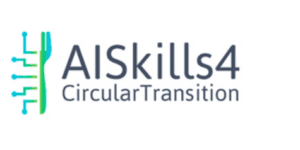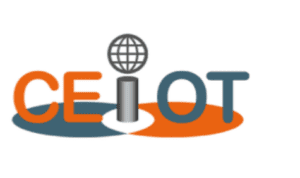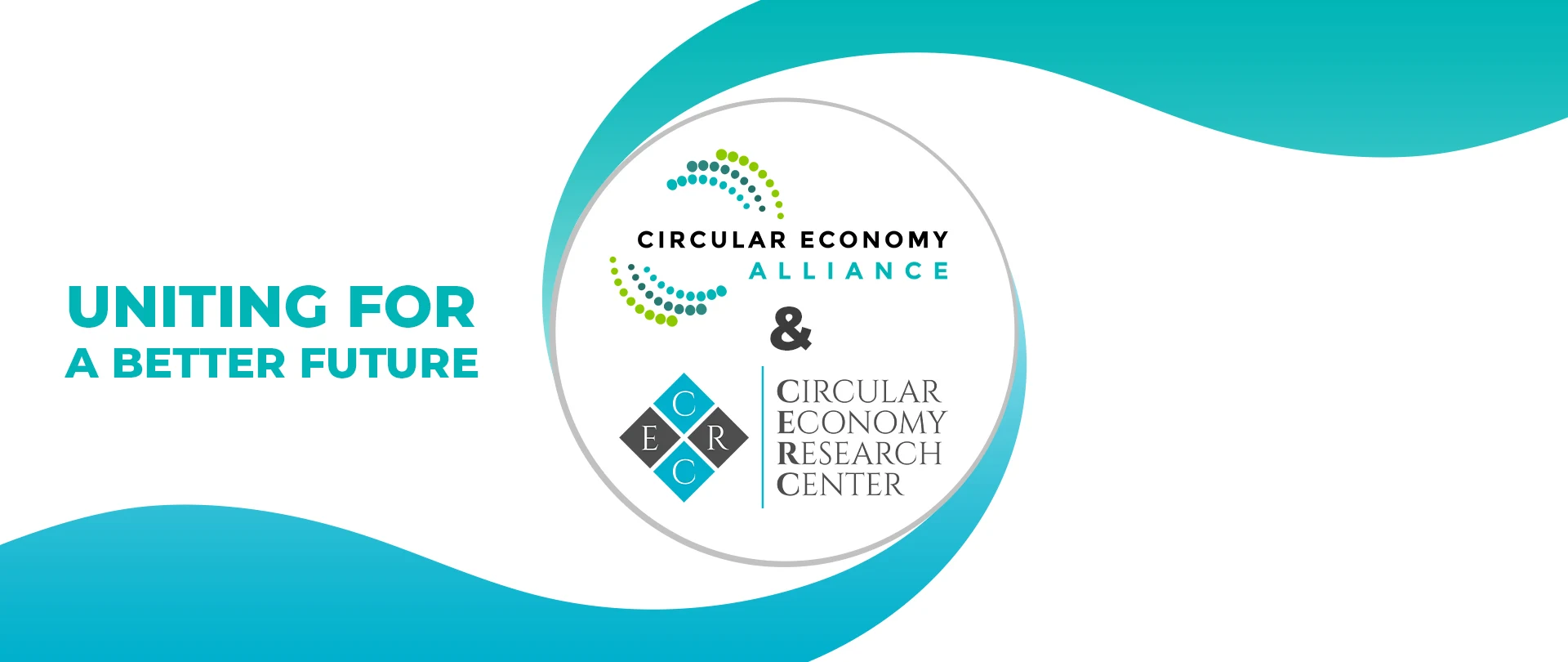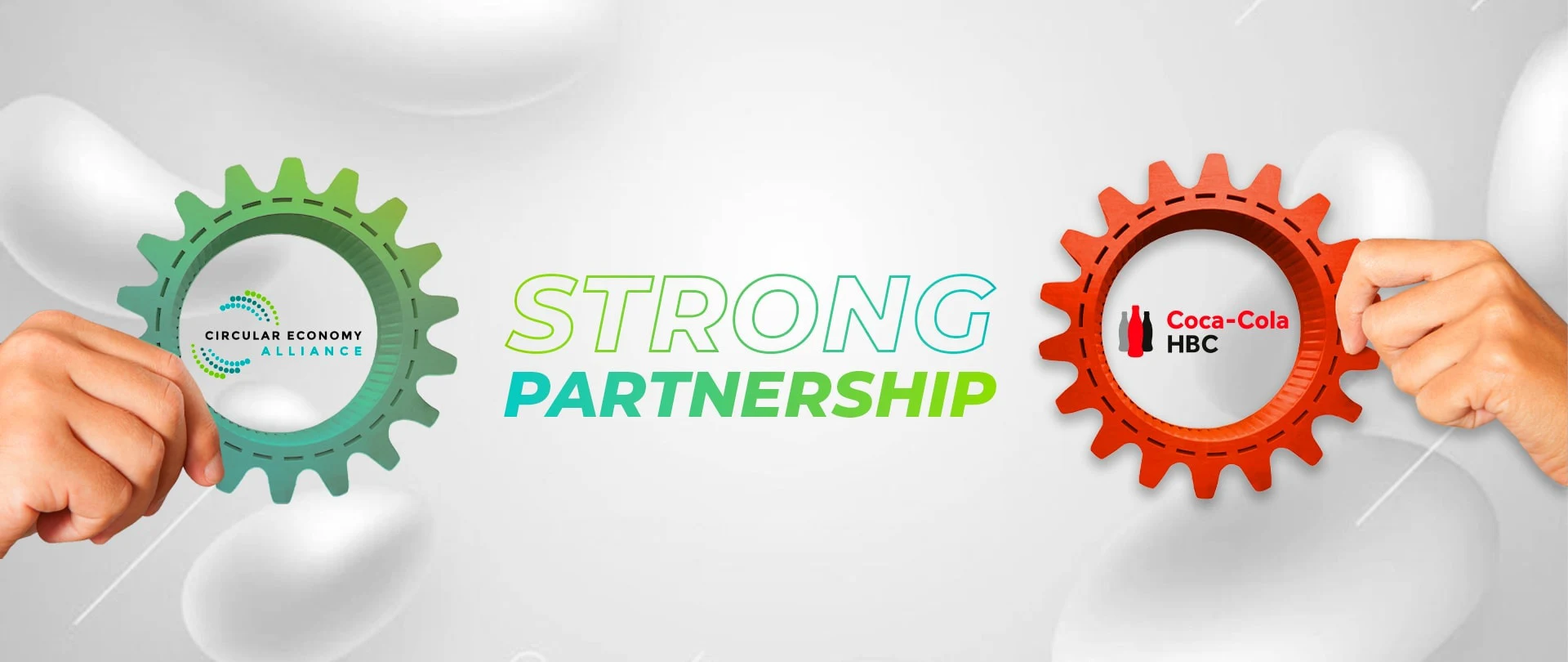The Circular Economy Research Center (CERC), leveraging on its research capacity acknowledged the strong gap between the skills required for the...
PARTNERS

[woocs sd=1]
The Circular Economy Research Center (CERC), leveraging on its research capacity acknowledged the strong gap between the skills required for the...
Companies are quickly realizing that providing value to shareholders can only be achieved by providing value to all stakeholders. In other words, companies that are looking to remain competitive and profitable, need to integrate purpose in their business model and strategy aiming to contribute to society. One company that has seen this as fundamental to its business strategy already for many years, is Coca-Cola HBC. In this sense, the collaboration between the Circular Economy Alliance as a leading innovator in the Circular Economy domain and Coca- Cola HBC as the world’s most sustainable beverage company in the Dow Jones Sustainability Index follows naturally[1]. The two purpose-driven companies have recently signed an agreement of cooperation aiming to develop a long-standing collaboration in the domain of Circular Economy.
For over 2 centuries, we have developed and perfected the linear model of manufacturing: Extract resources from nature — refine and manufacture goods — consume and throw away…
This is the model of consumption we have been training the workforce for, for generations. However, climate changes, increasingly frequent environmental disasters, and the global pollution crisis is forcing us to stop this destructive behaviour. We need to take action and change now — today, not tomorrow.
The need for continuous upskilling and reskilling as part of a lifelong learning culture is becoming increasingly apparent. The disruptive trends driving this need, including climate change, and emerging technologies have been underway for quite some time. The difference now is that the pace of emerging technologies is accelerating and converges with as well as enables the transition to a Circular Economy (CE). The pandemic has only propelled even further the digital transformation of companies and a reconsideration of work modalities. CE is the means to achieve decoupling of economic growth from resource use, eliminate waste by design and prevent environmental collapse. It offers a viable pathway to grow out of the linear economy. The converging changes mean that individuals must navigate a steep learning curve and adapt to the need for continuous upskilling and reskilling to remain relevant and ahead of the curve in the new working landscape.
Chrysostomos Dimitriou is an IT at Circular Economy Alliance. He balances organizational objectives to strategize and provides recommendations to maintain a competitive business edge.
Chrysostomos has a Bachelor’s Degree in Management Information Systems. Previously, he worked in Higher Education in the Information Systems sector, specializing in solving technological problems and improving customer experience.
As a critical thinker, Chrysostomos identifies unconventional strategies to achieve success.
Circular Economy Network
About Us
Customer Support Form
Circular Economy Alliance Members Story
As an organization, if you are interested in becoming a member of our network, please complete this application form with all pertinent information. Once your application has been approved, all the information presented below will be published on our Know
Piotr is a Belgian/Polish national with over 11 years of experience in circular economy policy development. Currently, he is a Circular Economy Program Manager at the African Circular Economy Network (ACEN) Foundation, and a Council Member of the European Environmental Bureau. Previously he worked at the Polish Ministry of the Environment and Polish Humanitarian Action in South Sudan. He holds two Master’s Diplomas in Spatial Management, Environmental Sciences and Geography. In 2022 he accomplished Leaders for Nature Academy by MAVA Foundation.
He was chairing the Waste Working Group of the EEB in the years 2013 -2023. It comprises of local waste management experts across Europe and beyond, with hands-on experience in waste systems, and upstream product policy. In 2016 Piotr co-founded and continues to be a Board Member of the Polish Zero Waste Association, working closely with Zero Waste Europe, Rethink Plastic Alliance, and others.
He has been a Jury member of the European Week of Waste Reduction in years 2013-2021, assessing local waste prevention measures across Europe. He also has international experience advising on waste policies in Bangladesh, India, Kenya, Oman, the Balkans, and Türkiye.
Piotr speaks fluent English and Polish, communicates in French, German, Spanish, and Catalan, and knows the basics of Arabic and Russian.

The Circular Economy (CE) concept, driven by Industry 4.0, is expanding into various sectors. It requires new skills and competencies aligned with sustainability principles. Initially impacting supply chain management, these skills extend to entrepreneurship, innovation, and societal development. Research highlights the potential for sustainability by combining CE and Industry 4.0 perspectives through education and practical cases. CERES recognizes the need to broaden CE beyond firms and supply skills and knowledge to higher education (HE) and vocational education and training (VET). The Circular Economy Digital Innovation Hub (CE-DIH) aims to connect stakeholders and offer services, skills, and knowledge to support CE across industries and society, promoting sustainability and innovation.

Dr. Robert Rosenfeld is an experienced educator and facilitator helping senior leaders in organisations define and implement strategies that deliver sustainable business value.
As an entrepreneur, Robert combines a practical commercial perspective with his leadership approach. Robert formulates and implements strategy, culture, change management, and business growth.
Throughout his career, Robert’s teaching, consulting and research activities have focused on the strategic and organizational implications of changing industry paradigms and their impact on commercial business models.

Alessio Franconi, PhD in Circular Design from Iuav University of Venice (IT), is a research fellow at Brunel University London and the Circular Economy Research Center. His research interests lie at the intersection of Circular Economy, design strategies, Industry 4.0, and the Product Service-System.
Alessio is a member of the Circular Metal Research Center, one of five transdisciplinary Circular Economy centres sponsored by the UK Research and Innovation’s Strategic Priorities Fund program.
In addition to his research activities, Alessio is the creator and curator of Circular Design, the first open-source tool for organising and managing circular design strategies.
He was recognised as one of the first Blue Economy experts at the University of Pécs (H) in 2016 by Prof. Gunter Pauli and selected for the prestigious Fulbright-Fondazione Simone Cesaretti fellowship by the Fulbright Italy commission in 2018. During his Fulbright research, he conducted studies at the Rochester Institute of Technology (NY, US).
Dr. Mark Esposito is a Professor of Business and Economics at the Hult International Business School where he directs the Futures Impact Lab. He is also a Resident Fellow and Professor of Economic Policy at Mohammed Bin Rashid School of Government in Dubai, as well as at Harvard University’s Division of Continuing Education. He served as Institutes Council Co-Leader, at the Microeconomics of Competitiveness program (MOC) at the Institute of Strategy and Competitiveness, at Harvard Business School under the mentorship of Professor Michael E. Porter and still served as affiliate faculty to the program.
He is recognized internationally as a top global thought leader in matters relating to The Fourth Industrial Revolution, the changes and opportunities that technology will bring to a variety of industries. He is Co-Founder & Chief Learning Officer at Nexus FrontierTech, an AI scale-up venture. In 2021, he co-founded the Circular Economy Alliance where he serves as Chairman of the Strategic Foresight Board. He was inducted in 2016 on the radar of Thinkers50 as one of the 30 most prominent rising business thinkers in the world. He is a Senior Advisor to the Ideation Center of Strategy& at PwC.
He is a global expert of the World Economic Forum and advisor to national governments and currently serves as Subject Matter for the Prime Minister Office in the UAE.
He holds a Doctoral Degree in Business Administration from Ecole des Ponts Paris Tech, one of France’s most prestigious Grande Ecole.
Ken Webster is a Visiting Professor at Cranfield University
From 2010 – end 2018 he was Head of Innovation for the Ellen MacArthur Foundation, a circular economy pioneer organization, where he helped shape current notions of a ‘circular economy’.
His book The Circular Economy: A Wealth of Flows (2nd Edition 2017) relates the connections between systems thinking, economic and business opportunity and the transition to a circular economy.
Will is an accomplished business executive with extensive global experience, as a change agent, entrepreneur, advisor, attorney and educator in climate change and environmental sustainability. His accomplishments include substantive results in business start-ups, leadership, professional services, marketing and management consulting.
He is a Professor of Practice at Clark University School of Management and also teaches Consulting for Sustainability Capstone at Harvard Extension School. Since developing the course in 2007, Will has advised graduate/executive students, at various business schools, resulting in successful consulting engagements for over 500 client organizations worldwide.
Will is dedicated to developing future leaders in the sustainability profession and has served on various non-profit boards related to Sustainability practices in business.
RSA Fellow, lifelong learner, mentor and serial entrepreneur passionate about how the combination of technology, innovative business models and the use of global networks and resources can create social, economic and environmental impact. Combining her broad background in technology and focus on sustainability, she has a proven record of converting ideas into action for positive societal change.
Founder and Systems Architect of Circular Regions – a cross-sector, multi-stakeholder, data-driven platform designed to activate Circular Eco-systems and bridge top-down and bottom-up through digitised living circular case studies.
Convener of the Circular Economy Coalition – An international coalition of value-aligned individuals and organisations with Founding Members in over 20 countries collectively advancing the circular economy through shared tools and resources. Connecting Research & Academia, the Third & Private Sectors as well as the Public & Financial Sectors. Supporting cross-pollination of data and research for systems awareness
Active member of the European Circular Economy Stakeholder Platform Leadership Groups including Economic Incentives, Network Governance, Cities & Regions, Biodiversity, Social Enterprise.

Ushma Menon is a Digital Marketing and Event Manager at Circular Economy Alliance. She is managing all company’s digital marketing operations and event coordination.
Ushma has a Master’s degree in Journalism and Mass Communication with a specialization in Broadcast Journalism. She has various diplomas, including a Diploma in Journalism from the University of Art London.
Ushma is a passionate media professional with over eight years of experience in digital media. She completed several internships in different media sectors such as radio, news, advertising agencies, and television. Ushma has worked on multiple shows featured on both the NDTV and HISTORY channels. She was also selected as one of India’s Top Ten Communication Officers for 2022 by Women Entrepreneurs magazine.

Stephanie Pilavaki is a Client Relationship Manager at Circular Economy Alliance. She is responsible for managing new business opportunities including but not limited to new markets, clients, and partnerships promoting the domain of Circular Economy and our Body of Knowledge.
Stephanie has Bachelor’s degree in Marketing and Management, a Master’s degree in MBA and a Master’s degree candidate in Career Guidance and Counselling. Currently, she is attending the Train the Trainer program by the Human Resource Development Authority of Cyprus.
Stephanie has 11 years of experience in customer service, team coordination, and training in the educational sector. She is an experienced team leader and believes in the power of collaboration.

Sofia Hamika is a Digital Operations and Quality Assurance Manager at Circular Economy Alliance. She maintains product quality, ensures the development of an efficient strategy to address the current and future digital business needs of Circular Economy Alliance, and manages in general the digital branding aspects of the latter.
Her educational background includes a Bachelor’s degree in Media Culture and Production from Southampton Solent University.
She is a diligent, determined and team-minded individual, with extensive experience in Business Development, Digital Marketing, Multimedia Event Planning and Office Administration.

Panagiota Savva is a Digital Operations and Quality Assurance Manager at Circular Economy Alliance. She maintains product quality, ensures the development of an efficient strategy to address the current and future digital business needs of Circular Economy Alliance, and manages in general the digital branding aspects of the latter.
Her educational background includes a Master’s degree in Communication and Journalism and a Bachelor’s degree in Byzantine and Modern Greek Language and Literature.
Panagiota has extensive experience in Quality Assurance in higher education, and she is a dedicated and reliable individual who is focused on her work and ensures that everything runs smoothly, and is responsible to keep progress on track.

Joyce Halloun is a Business Solution Manager at Circular Economy Alliance.
She holds a Bachelor’s degree in Business Management, as well as she is a certified Program Manager and currently pursuing her Masters in Circular Economy management.
Joyce is an accomplished businesswoman with over 10 years of experience in business development and logistics. She is a dedicated researcher for innovative concepts, preserving natural resources and emerging new technologies, the Circularity goals, the SDGs, and climate neutrality.

Joyce Halloun is a Business Solution Manager at Circular Economy Alliance.
She holds a Bachelor’s degree in Business Management, as well as she is a certified Program Manager and currently pursuing her Masters in Circular Economy management.
Joyce is an accomplished businesswoman with over 10 years of experience in business development and logistics. She is a dedicated researcher for innovative concepts, preserving natural resources and emerging new technologies, the Circularity goals, the SDGs, and climate neutrality.

Georgia Solomou is an Operations Manager at Circular Economy Alliance handling core human resource and operations functions. Her techniques and mindset quickly brought great value to the Organisation.
Georgia is a highly motivated, target-driven individual, with a bachelor’s degree in Political Sciences and a Master’s degree in International Relations. With more than 12 years of experience, Georgia is a powerful force in the workplace.
She assumed a leadership role as the Head of the Administration Department, and as the Data Protection Officer of the company for which she previously worked.

Christos Papakyriakou is an entrepreneur, co-founder, and Director of the Circular Economy Alliance. He graduated from Imperial College with a BSc. in Biochemistry and an MSc. in Finance.
Christos has explored operational and strategic opportunities for several projects in Europe and the Middle East, where he was responsible for idea generation, research, strategy and fundraising.
Previously, Christos worked at Dresdner Kleinwort in London in the IPV department for Structured Credit. He has also completed an internship in FX options trading with Calyon Investment Bank London.
Certified Circular Economy Specialist and business development professional with 15+ years of experience across several industries and disciplines. Pragmatic, open-minded, entrepreneurial and solution-oriented. Enjoying a challenge and getting things done, excellent in mapping out relevant ecosystems, identifying common interests and establishing mutually beneficial relationships with all stakeholders.
Currently offering consulting services for businesses and organisations, which would like to understand the meaning of circularity and sustainability, its relevance and application to their operations, as well as to embark on the path of transformation towards (greater) circularity and sustainability to achieve long-term resilience and sustainable competitive advantage.
In 2015 founded a company to bring to the market a novel disruptive green technology and machinery for the upcycling of feather waste into high-quality protein-rich feed ingredient for aqua feed and pet food, enabling a strong circularity link between food and feed industries.
Prior to that worked as an Investment Director at P&S East Growth private equity fund and Country Manager for Ukraine at P&S Capital, also including cooperation with Banque Privée Edmond de Rothschild Europe in relation to their entering the Ukrainian market.
Holds an MSc in Development Management from the London School of Economics and a BSc in Economics from the University of Maastricht. Completed Circular Economy and Biobased Industries Micromasters study programmes by the Wageningen University.
Overview
The C.E.A Circular Economy Alliance LTD (hereinafter referred to as ‘CEA’, Circular Economy Alliance’, the ‘Company’), in collaboration with the Circular Economy Research Center (hereinafter referred to as ‘CERC’) and École des Ponts Business School, offers various levels and bundles of certification relative to Circular Economy. The purpose is to unite core circular economy principles, skills, frameworks, tools, practices, and strategies under a single, universally recognized certification.
The following terms and conditions are to be read and enforced together with the Company’s Privacy Policy and General Terms and Conditions.
Applicant/Candidate/Participant/Recipient/User: shall mean the person, firm, company, partnership, association, or government agency or any other authority that will agree to CEA’s terms, so as for the latter to provide the services as described below and identified as such in the applicable Order Form, the General Terms and Conditions, the Terms and Conditions for Certification in Circular Economy and/or any other agreed written instructions and policies, to the former.
Body of Knowledge: The Circular Economy Body of Knowledge is a unique research-driven effort jointly led by the Circular Economy Research Center (CERC) of the École des Ponts Business School and the Circular Economy Alliance (CEA). The Pact for Skills, a flagship initiative of the European Commission launched on 10 November 2020, under the European Skills Agenda for sustainable competitiveness, social fairness, and resilience stresses the importance of joining forces and taking concrete action aimed at upskilling and reskilling the workforce. Responding to the call, CERC and CEA joined forces to provide the global workforce with credible, research- and practice-based skills training in the domain of Circular Economy. The existing gap between Circular Economy skill requirements and skills availability needs to be closed. In this respect, this novel and niche Body of Knowledge serves a purpose-driven agenda.
Course Bundles: shall refer to the courses included and/or required to validate to obtain a Certification.
Certificate or Certification or Certification Scheme: shall mean the certification related to the subject of Circular Economy and based on the Body of Knowledge.
Individual/Single Courses: shall refer to a specific course in the Body of Knowledge composed of several sections, learning “challenges” (brief knowledge check questions to help the learner assimilate the content) following each section, and final multiple choice randomized exam to validate the course. This can be referred to as a course or a module without distinction.
Order/Registration Form: shall mean CEA’s standard online registration form for Certification to be completed by an Applicant setting out the Services to be provided by CEA, together with any other information concerning the performance of the Services under these terms and conditions and the General Terms and Conditions.
In these Terms and Conditions:
These terms and conditions define conditions, rights and duties, as well as the operating processes for obtaining a Certification in Circular Economy. It also contains information on Certificate maintenance or cancellation. The terms and conditions presented in this document govern the relationship between CEA and its Applicants and apply to all Applicants unless exceptions are specifically agreed upon between the parties. In any case, exceptions cannot in any way concern the conformity assessment procedures according to which CEA is required to operate. If CEA, or the Applicant, is unable to fulfil the obligations because of force majeure (forces beyond CEA’s control, including, without limitation, war declared or undeclared, natural disasters, fire, flood, strikes, pandemic, labour troubles, or other industrial disturbances, governmental restrictions or regulations, riots, insurrections, or other cause beyond the control of the CEA), an extension period for the fulfilment can be agreed upon between the Applicant and CEA (the ‘parties’).
CEA has established policies, procedures, and fees that govern Certification decisions, the uses of Certification, and interactions with Applicants. These policies, procedures, and fees may be revised by CEA at any time without prior notification. These policies, procedures, and fees are freely available on CEA’s website. Any person who registers with CEA accepts and agrees to abide by these policies and procedures in all dealings with CEA.
Certificates are issued as follows:
How to Apply for Certification:
The following steps describe the application process:
Certification, Eligibility, Effort and Price
The following is a table summarizing Certification by number of Chapters, expected learning effort, target audience / recommended background and experience, and the price of each certification.
| Certification | Chapters | Expected effort | Desired academic background | Desired work experience |
Price |
| Certificate of Completion (CoC) | 1 | 3 hours | Open access | None required | €95
(+VAT where applicable) |
| Circular Economy Professional (Foundational)/(CEP) | 4 | 16 hours | Open access | None required | €385
(+VAT where applicable) |
| Circular Economy Manager (Advanced)/(CEM) | 8 | 30 hours | Open access | None required | €745
(+VAT where applicable) |
| Circular Economy Specialist (High-Mastery)/(CES) | 12 | 45 hours | Open access | None required | €1,085
(+VAT where applicable) |
All Certificates are delivered by École des Ponts Business School of Paris, France, and issued through a digital certificate platform. All certified members receive a unique private link to their blockchain-secured verifiable digital certificate that they can choose to share (or not). This ensures that third parties (recruiters, HR directors, academic institutions) can verify the veracity of all CEA Certificates easily and efficiently.
Validation & Assessment
Each Course requires successfully achieving a score of at least 70% on a randomized 10-multiple choice, timed exam (also referred to as the exam) relative only to the content of the Course and not requiring any previous knowledge. All Courses are self-contained in relation to validation and obtention of Certification. All courses of a Certificate must be successfully validated through the successful exam outcome, and they have to be taken in the predefined order in view of obtaining the Certification.
There is no exam requirement when purchasing any of the individual courses for achieving a Certificate of Completion (CoC).
Time Allotted
Learning is online and self-paced. Each exam is available upon completion of the Course content, and you will have 15 minutes in the end to answer all questions. The exam results are automatically displayed on the screen and available in the Talent LMS. The Course exam can be taken three times. In the event the Participant does not pass the first three attempts, there is an option to pay an additional €45 to take the exam again. This is a safety precaution to eliminate possible abuse of the multiple-choice exam format. The exam should be easily validated in one to three attempts for anyone applying themselves seriously to the Course content. The exam retakes option can be renewed at the Participant’s discretion, as often as desired or necessary, up to one year from initial registration.
All Courses must be validated within one year of the initial registration. Thereafter the content will no longer be accessible, and no Course exam takes, or retakes will be possible. This means that once you register for the course from the enrolment date, you will have 365 days to complete the course. Upon successful completion of the course earlier than 365 days, your access to the learning platform will be revoked and you will have 14 days to download any available materials.
Payment & Refunds
Payment must be completed before starting any course(s) and it is concluded at the registration phase. The amount to be paid is always displayed clearly for each product and the calculation of possible taxes such as VAT takes place visibly at the checkout. If you decide not to complete a course or certification that you have paid for, CEA may be able to refund your payment depending on your situation. This refund is subject to verification that you have not made any use or interacted with the digital material which consists of the course including but not limited to the Chapter book, the e-learning course, and the exam questions.
In accordance with EU guidelines relative to “buyer’s remorse”, if you pay for a Course or a Certification bundle, you can request a refund within 2 weeks (14 days) after your payment. Once you have already initiated the delivery of the digital content of the course, included but not limited to downloading the respective Chapter or initiating the digital delivery of the e-learning course, and/or earned your Certificate, you are no longer eligible for a refund, even if you earn your Certificate within the two-week refund period.
We do not offer partial refunds for Courses not completed. If you are not sure you will want to complete the entire bundle of a Certification, we recommend you pay by Course.
Membership
Following successful completion of a Certification, Certified Members/Certified Learners are automatically registered as verified members of the CEA certified members Directory. Membership is non-transferable. As a certified member, you can opt-in to receive regular updates, news, invitations to events, and access to new research and resources on the Circular Economy. You will receive exclusive invitations to community events, conferences, presentations, workshops, and networking opportunities.
As the field of circular economy evolves, so will the best practices, strategies, and skills necessary for adopting it successfully. CEA and CERC are committed to regularly updating the circular economy certificate curriculum and Body of Knowledge to integrate the latest developments. Certified members will be notified of new additions, so they can continue to maintain their circular economy expertise. In addition, Certified Members will receive ‘early bird’ and ‘loyalty’ discounts on all future educational and training products developed by CEA and CERC.
Maintaining Active Certification
A large-scale transition to a circular economy depends on a highly skilled community actively collaborating towards a shared goal. By remaining an active member of the Circular Economy Alliance certified members directory, you will stay updated on the current developments within the circular economy. You will also have access to a directory of certified professionals sharing experiences and best practices for applying circular solutions to real-world problems. In addition, for those with a valid and active certification, there will be no requirement to retake any assessment or exam (unless as stated above your certification and therefore your membership will expire in case of more than one calendar year without renewal). Upon expiration, you will be required to redo the certificate in the future in case you wish to reinstate it.
The initial membership period is valid for the one calendar year following the Certification. It will not be automatically renewed; therefore, the respective notification of the renewal will be sent in advance to the contact details registered in your CEA account as a reminder. Maintaining your membership and renewing your Certificate’s validity requires an annual fee of €50. Only those with a valid and active certification can be members of the registered Circular Economy Alliance certified members directory.
The maintenance of the Certification applies to the Certified Circular Economy Professionals, Managers and Specialists (CEP), (CEM), and (CES) respectively. This does not apply to certificates of completion for individual courses (CoC).
All certified learners are registered in the Circular Economy Alliance certified members Directory¹. provided that they will give their consent to act as such.
Be part of a vibrant international community of CE stakeholders, researchers and organizations.
The Circular Economy Alliance works to unite businesses, NGOs, and government institutions around the transition from a linear to a circular economy. A certification on circular economy enables a common understanding of the prevailing circular economy topics and facilitates collaboration across industries, sectors, and borders to achieve sustainable, long-term change.
For or additional information or technical support, please see the Contact Us page on our website. Finally, we strongly recommend carefully reading our Privacy Policy and the General Terms and Conditions.
Daliya Safiullina is a results-driven Sustainability consultant with over 9 years of experience that lies at the junction of sustainability, urban planning, sociocultural modelling, environmental design, circular and regenerative economics. She has invested her career in transforming cities to a fundamentally sustainable state, making them more comfortable to live in, while regenerating urban ecosystems.
Daliya had been managing large-scale urban development projects at a multidisciplinary strategic consulting Strelka KB, based in Moscow, leading teams and international experts to develop tailored vision and strategy to be translated into real action plans, from Russia and CIS to China and Middle East. Daliya’s projects include spatial development strategies at scales ranging from neighborhoods to cities and regions, renovation of major public spaces for 40 cities as part of FIFA World Cup 2018 legacy. Realized projects were shortlisted in international awards, including ISOCARP and Urban Land Institute Global Awards for Excellence, Gulf Sustainability and CSR Awards.
Having a formal training in Architecture (MArch from Montana State University), she has expanded her expertise while pursuing Sustainable Cities and Communities graduate certificate from Harvard Extension School, learning the frameworks of circular and regenerative economics, renewable energy, decarbonisation of the building sector.
Dr. Alexandros Charalambides is an Associate Professor at the Cyprus University of Technology, working on how innovation and entrepreneurship can play a significant role in a nation’s efforts for decarbonization and on predicting energy production from solar systems.
He is also the one of the founders of Chrysalis LEAP, the first cleantech accelerator in Cyprus, and has mentored and coached more than 100 startups over the past years.
Dr. Charalambides graduated from Imperial College London with a BEng and PhD in Mechanical Engineering.

With a Career spanning 20-years with 10-years dedicated to the Renewable Energy industry in Southern-Africa, William has gained valuable knowledge on what drives these markets. As a Certified Financial Modelling & Valuation Analyst, Certified Circular Economy Professional, and his applied skills gave him the ability to assess and evaluate Renewable Energy Projects from a more holistic angle. William’s experience in African markets and the Geopolitical complexities gave him a strong capacity to commercialize opportunities. His passion for personal development is constantly leading him to pursue continuous education and it was his way forward in self-investment by gaining numerous certifications in Renewable Energy Technology advancements, Finance Markets, and International Business Management concepts. William has proven his ability to support both Technical & Financial Stakeholders and heavily contribute to the greater Southern African market he is active in.

“Stefano Ingallina has a strong interest in diplomacy, international relations, and geopolitics. Throughout his career, he contributed to building political strategies and developing projects on the topics of interregional cooperation, European integration and environmental policies.
Stefano has been working for the European Economic and Social Committee, at the Sicilian Parliament, and in the private sector taking care of regional cooperation and internal and external relations. Currently, he plays a pivotal role within the Movimento Europeo Italia as youth national coordinator.
He holds two master’s degrees in “International Studies and Environmental Policy”, in Italy and the Netherlands. He is passionate about all topics related to sustainable development, the circular economy model and environmental protection. He likes challenges and international initiatives and is willing to challenge any obstacles to fight against climate change.
Regarding the circular economy, his journey started in 2015 and since then he never stopped conducting research, connecting people and institutions and sharing his passion for this model.”

Dr. Saman Sarbazvatan is a passionate technologist with more than two decades of hands-on cross-sectoral experience. Saman works on the convergence of Circular Economy, Digital Economy, and Sustainable Competitiveness as a practitioner, professor, researcher, and senior advisor.
Saman works with academia and industry to bridge the gap between research and practice. He focuses on the applications and implications of enabling technologies in propelling inclusive, impact-oriented, and purpose-driven innovations in business, industrial, and economic models toward SDGs, ESG, CSR, and Circular Economy.

Tze Ni Yeoh is a Packaging Sustainability Innovation Manager at Colgate-Palmolive, with broad experience in circular economy design and waste management infrastructure in the consumer goods industry.
In 2019, Tze founded the first Circular Economy Symposium at Harvard. As an economist and Circular Economy Specialist, Tze focuses on developing solutions to combat plastic waste, particularly in developing countries.
Tze was also a consultant at the World Bank, where she provides advisory on projects related to the Circular Economy, private sector competitiveness, and plastic value chain analysis.
Tze is an advocate for a zero-waste lifestyle and volunteers as a speaker and content creator for Zero Waste Malaysia.

Dr. Alessandro Lanteri is a Professor at the ESCP Business School ranked #4 by the Financial Times and some of the world’s top business schools.
Dr. Lanteri is an expert educator who helps multinationals and governments across five continents navigate turbulent environments and seize new opportunities.
Dr. Lanteri is also a bestselling author, well-known for his book Clever, which became an Amazon #1 bestseller in the UK and Italy. Dr. Lanteri published his new book called Innovating with Impact by the Economist in 2023.

For over 20 years, Henrik Homann operated his family’s office, where he manages venture financing, private equity, and M&A advisory.
Henrik is a graduate of European Business School. His previous roles include Head of Business Planning for Airbus in Germany, CFO of TUI’s business unit Central Region, and being member of the Group Executive Committee of TUI for several years.

Terry Himes is a JPL Spacecraft and Software Engineer. He obtained his BS degree in Computer Science from Michigan State University with a Minor in Business and Systems Analysis.
Over 30 years ago, Terry had the chance to start his own software company, Princeton Networks Corporation. Shortly after, he began working on Deep Space missions on JPL’s Mars Observer spacecraft.
Terry has played critical roles for the successful development and Flight Operations of the Mars Perseverance rover and Ingenuity helicopter, Mars InSight Lander, Mars Phoenix Lander, and missions to comets, Deep Impact and Rosetta.
Today, Terry has worked on over 30 deep space missions.

Chiara Battistoni is a Circular Economy Specialist and an Industrial and Systemic Designer. In 2020 she held a Ph.D. in Management, Production and Design in Politecnico di Torino (IT) where she focused on relationships between Systemic Design and Circular Economy in the manufacturing sector and the opportunities at the entrepreneurial level. She has also developed several research activities with the Systemic Design Research Group in Politecnico di Torino (IT). Chiara has collaborated on many national and European projects, such as RETRACE, with the Italian startup Mercato Circolare and with the international Blue Economy network by prof. Gunter Pauli. Since 2022 Chiara is a researcher at Università IUAV di Venezia (Venice, IT).

Wildfires, drought, flash floods… the world seems caught in perpetual struggle as global weather systems shift and change. The result is not just loss of life and property, but also a trigger for disease, molds, and pests that can wipe out entire crops in 48-hours or less. Hence the need for remote sensing (aerial-imaging), a rapidly improving technology that uses special cameras to detect, among other things, oncoming devastation before it’s too late. Currently, remote sensing uses three types of camera platforms: satellites, unmanned aircraft systems (UAS), and manned aircraft. All have their strengths and weaknesses.

Dr. Terence Tse has a Ph.D. from University of Cambridge, UK. He started off his career in investment banking and consulting. He is an educator, speaker, and advisor.
Tse is a co-founder and Executive Director of Nexus FrontierTech, an AI scale up. In parallel, he is also a professor at Hult International Business School and regularly provides commentaries on the financial market in the Financial Times, The Economist, the World Economic Forum.

Amy Ryan is the Co-founder and CEO of ESG Strategies. She helps clients discover and mitigate ESG operational risk through Circular Economy concepts and multi-dimensional partnerships.
Amy has a Bachelor of Science in Earth and Atmospheric Science from the University at Albany (SUNY) and a Master’s Degree from Harvard University in Business Management.
Today, Amy has nearly 20 years of experience in environmental risk, social cause, and regulatory governance. She is an advisor for leaders within industrial manufacturing, government, and community-based organizations.
Amy is also an Independent Director for the Oil Dri Corporation’s (NASDAQ ODC) Board of Directors and sits on the Boards Nominations Committee.

Anne Babalola is a lawyer, investment and policy advisor, and consultant with degrees in law, public policy, and business administration from various universities.
Anne advises corporate, public, and state entities in Europe and Africa. Her work primarily focuses on private sector competitiveness, investment policy, and arbitration and regulatory governance.
Anne has also worked as an advisor for family office operations, strategy, investments, and private equity.

Catherine Weetman is an international speaker, workshop facilitator, coach, consultant, and host of the Circular Economy Podcast.
Catherine is the founder of Rethink Global––an organization designed to help businesses, social enterprises, and community groups use Circular Economy approaches to build a better world.
Beyond this, Catherine is an author. Her award-winning book, A Circular Economy Handbook: How to Build a More Resilient, Competitive and Sustainable Business, helps explains the what, why, and how of the Circular Economy.

Dr. Juergen Schroeder is a Senior Partner Emeritus at McKinsey & Company, Inc., and an investor and advisor for several start-ups focused on sustainability and the Circular Economy.
Dr. Schroeder has a Ph.D. in Economics from Ruhr University Bochum. For over two decades, he has supported global corporations in the travel, transport and logistic sector and provided consulting services on digital transformation and education.
As a member of the IACD, Dr. Schroeder actively contributes to his local network.

Dr. Walter Stahel is the founder of the Product-Life Institute in Geneva––a company that aims to provide practical financial and economic growth strategies with lower resource consumption.
Beyond this, Dr. Stahel is an architect, researcher, industrial analyst, educator, author and speaker. He is also a member of several Scientific Advisory Boards and a Senior Researcher at the Circular Economy Research Center at École Ponts Business School.
Dr. Stahel teaches at the University of Surrey’s Engineering and Physical Sciences faculty, where he shares his knowledge with the next generation.

Manuel Maqueda teaches Applied Circular Economics at Harvard Extension School. He has founded several notable, mission-driven organizations, including SUPER®, which enables businesses to eliminate single-use plastics through a tiered certification program.
In years previous, Manuel taught at the University of California–Berkley, where he created a multidisciplinary Circular Economy online course.
As a forward-thinker, Manuel has consulted for notable futurist organizations, such as the Jeff-Bezos-funded Long Now Foundation, dedicated to fostering long-term thinking in the context of the next 10,000 years.
Manuel is also the author of the forthcoming book The Meaning Economy, which reveals how meaning transforms the economy and our future.

Phanos joined Barclays as a Managing Director in 2011, direct from a tenure as a partner at Deloitte. Before his time at Deloitte, where he was made Partner within 8 years, he completed an MSc in Mathematics at the University of York. Currently, Phanos is a Chartered Fellow of the Chartered Institute for Securities and Investment and a Chartered Wealth Manager. He also holds an MBA from the University of Chicago’s prestigious Booth School of Business.

Ali Rebaie is a data anthropologist, industry analyst and global keynote speaker. In his early 20s, Ali founded Rebaie Analytics Group, which has acquired a global Fortune 500 clientele base.
Ali is consecutively listed among the top AI Influencers and featured in global media outlets for his contributions to the industry.
Ali has helped thousands of data enthusiasts adopt 21st-century skills. He shares his unique anthropological perspective on the challenges of the new economy, the fear of AI Robo-advisors replacing the role of human advisors, and how these issues affect human lives.

Dr. Barak Ben-Avinoam is the Managing Partner of BGV Israel. Barak manages BGV’s operations in Israel and is responsible for identifying and mentoring the relevant companies in its portfolio.
Barak holds an MBA and a Doctorate of Business Administration from the International School of Management, Paris, France and a B.Sc. in Information Systems from Drexel University, Philadelphia, PA.
Barak is also a member of the Investment Committee and Advisory Board at the Israel Innovation Authority, a mentor, and a panellist at several international acceleration programs.

Dr. Saman Sarbazvatan is a passionate technologist with more than two decades of hands-on cross-sectoral experience. Saman works on the convergence of Circular Economy, Digital Economy, and Sustainable Competitiveness as a practitioner, professor, researcher, and senior advisor.
Saman works with academia and industry to bridge the gap between research and practice. He focuses on the applications and implications of enabling technologies in propelling inclusive, impact-oriented, and purpose-driven innovations in business, industrial, and economic models toward SDGs, ESG, CSR, and Circular Economy.

Professor Gene Crozier is an associate of Development Group International (DGI) with over 30 years of experience in the leadership development field.
Gene has a long history in accreditation, building institutions, designing qualifications and assessing individual and organisational capability. Previously, Gene held the role of Executive Director at BlessingWhite MENA (GP Strategies).
Gene is passionate about the circular industry and believes that Circular Economy thinking will radically change our approach to life.

Jon Lockhurst is a founder of Development Group International (DGI), a company he developed in 2009 with a mission to improve the health of individuals and organizations.
Beyond his role with DGI, Jon has vast experience in telesales, business development, client management, and coaching. Jon has also worked in the learning and development sector, providing clients with management and leadership training after university.
Today, Jon is proud of DGI’s success and continued commitment to supporting people’s well-being.

Dr. Walter Stahel is the founder of the Product-Life Institute in Geneva––a company that aims to provide practical financial and economic growth strategies with lower resource consumption.
Beyond this, Dr. Stahel is an architect, researcher, industrial analyst, educator, author and speaker. He is also a member of several Scientific Advisory Boards and a Senior Researcher at the Circular Economy Research Center at École Ponts Business School.
Dr. Stahel teaches at the University of Surrey’s Engineering and Physical Sciences faculty, where he shares his knowledge with the next generation.

Ilma Jabeen is a sustainability professional. She has researched and experimented with Circular Economy principles both at an academic and practical level.
Ilma’s work is at the forefront of Circular Economy, focusing on circular business models, cross-sector collaboration, energy transition and process management, where she strives to turn sustainability goals into practices. Ilma has worked with various stakeholders, including governments, contractors, and waste management firms.
In her pursuit to make building construction more sustainable, she obtained a Master’s in Building Engineering and specialised in Technology for Sustainable Development.
Ilma excels in analytical research, market analysis, stakeholder engagement, and understanding stakeholder needs.

Vlatka Katusic is a senior researcher at Circular Economy Research Center, responsible for managing, coordinating, and writing proposals for European projects. She is also a Circular Economy Specialist at CEA, developing content for a body of knowledge on the Circular Economy.
Vlatka has over ten years of experience as an environment and sustainability specialist for several small-medium-sized consultancy firms. Her expertise includes designing and implementing long-term sustainability strategies, facilitating public consultations, social dialogue, mediation, and negotiations.
After graduating with an MBA in Innovation Management in 2019, Vlatka embarked on a doctorate research journey at Ecole des Ponts Business School in Paris. On top of this, she holds an MSc in Environmental Law and Sustainable Development and a Bachelor of Law.
Vlatka loves working in multidisciplinary, collaborative, and international environments. She aims to close the idea-action gap for sustainability to implement Circular Economy principles.

Dr. Hernan Ruiz Ocampo is a senior researcher at the Circular Economy Research Center (CERC) and the Ecole Nationale des Ponts et Chaussées (ENPC). He is responsible for managing, coordinating and writing proposals for European projects.
Hernan’s research focuses on applying and identifying circular strategies in different industrial sectors. He also contributes to developing a body of knowledge to empower the workforce toward the transition to the Circular Economy.
Hernan obtained his Ph.D. in Process and Bioprocess Engineering at the Institut Mines-Telecom Atlantique. His research was part of an industrial project to develop new technologies for an SME in the water sector.
Hernan also has an MBA in Innovation Management, two Master’s degrees in Chemical and Biological Engineering and Urban Environments, and a Bachelor’s degree in Civil Engineering.

Chrysostomos Adamides is a specialist with the CEA and a researcher with the Circular Economy Research Centre at Ecole des Ponts ParisTech. His main area of focus is stimulating organizational transformation and the transition to circular business models through the development of the skills and competencies of the workforce.
Chrysostomos has an ALM in Sustainability and an MSc in Finance. Before joining the CEA, Chrysostomos worked for several years as part of the European Commission’s field team to develop and implement migration management action plans. In this capacity, he contributed to improving the health care provision and reception conditions for migrants in Greece and Cyprus.

Alon Rozen is Dean, CEO, and Professor of Innovation at Ecole des Ponts Business School. Alon helps students and companies succeed in new business ventures in his multifunctional roles.
After obtaining an MBA at the venerable Ecole des Ponts ParisTech, Alon spent over 20 years in startups and consulting. Later, Alon taught others what he learned to expand his impact.
Alon developed a unique framework called Dynamic Business Modeling, inspired by his research on business model innovation throughout his doctoral studies.
Over the years, Alon’s mission has naturally evolved into a growing passion for the Circular Economy and business models.
Matthew Greenley is the Director of International Cooperation at the Institute for Research in Circular Economy and Environment. Since 2014, Matthew has established partnerships with local and international universities, including the Romanian Government, the European Commission and the European Economic and Social Committee.
With over ten years of diverse professional experience, Matthew Greenley offers research, strategic planning, and international project management skills. Over the years, he has partnered with government and industry leaders to promote the Circular Economy concept and principles.
Matthew strives to apply the full range of his abilities in all that he does. Since 2020, he has been a research fellow at CERC and assists in developing the Circular Economy Alliance and Circular Economy-related research and projects.

Jonathan Scott is a senior research fellow at the Ecole des Ponts Business School’s Circular Economy Research Center (CERC). Beyond this, he is a teacher, manager and entrepreneur with over 28 years of business and higher education teaching experience in 17 different countries.
He has taught at the Rotterdam School of Management, Audencia Nantes School of Management, EADA School of Management and Bradford University. He has also conducted seminars and workshops at the Lorange Institute, the University of Perugia, the Yancheng Institute of Technology, and several private business training centres.
Johnathan has several degrees and certifications, including a Bachelor of Science, an MBA and MA in management, and a CELTA teaching certification from Oxford Brookes University.
He has written several business and management books, including Fundamentals of Leisure Business Success, The Concise Handbook of Management, Managing the New Frontiers, and The Sustainable Business.

Applying AI and a circular approach to the agri-food industry can improve our economy, society, and environment. Consequently, this project will develop AI knowledge and skills to support the circular transition of the agri-food sector. The AISkills4CircularTransition project will examine the opportunities and threats that follow the new task force defining novel business standards through implementing a training program on the opportunities of AI and CE within the agri-food industry.

In 1950 there were approximately 751 million people living in urban areas. According to the United Nations in 2018 that number rose to 4.2 billion or 55% of the world’s population. By 2050 the urban population is expected to rise to almost 70%. This places additional strain on countries to implement sustainable policies that balance the economic, environmental and social aspects, including resource management, sustainable infrastructure, housing, employment and basic services such as education and health care. Moreover, currently cities consume almost 80% of the world’s energy and produce more than 60% of greenhouse emissions (GHG) while the population density makes them particularly vulnerable to the effects of climate change including flooding, see rise, wildfires etc.

The maritime transport sector is responsible for more than 75% of the European Union’s external trade and is projected to grow in global shipping volume. A landmark study by the European Environment Agency (EEA) and the European Maritime Safety Agency (EMSA) shows that ships produce 13.5% of all greenhouse gas emissions (GHG) caused by transportation in the EU. Other significant impacts of the sector include the doubling of the underwater noise levels in EU waters between 2014 -2019 and the introduction of half of all the non-indigenous species introduced into European seas since 1949.

The European Shared Green Deal (SGD) is the European Commission’s blueprint and roadmap to make Europe the first climate neutral continent. The success of the deal depends on getting all European countries to transition to a sustainable and competitive economy. That includes, but is not limited to; Investing in environmentally friendly technologies. Supporting innovation across all industries. Rolling out cleaner, cheaper, and healthier forms of private and public transport.

The Internet of Things (IoT) is one of the emerging technologies which can enable and accelerate the transition from a linear to a Circular Economy (CE). In view of this the European Commission through the EU HORIZON 2020 MSCA RISE programme, funded the CE-IoT project with a budget of EUR 1,692,000 and a duration of four years, from July 2018 to June 2022. The consortium is comprised of 6 partners including academic institutions, as well as consulting, information technology and telecommunication companies.

Companies are quickly realizing that providing value to shareholders can only be achieved by providing value to all stakeholders. In other words, companies that are looking to remain competitive and profitable, need to integrate purpose in their business model and strategy aiming to contribute to society. One company that has seen this as fundamental to its business strategy already since many years, is Coca-Cola HBC. In this sense the collaboration between the Circular Economy Alliance as a leading innovator in the Circular Economy domain and Coca- Cola HBC as the world’s most sustainable beverage company in the Dow Jones Sustainability Index follows naturally.
You have shown interest in joining C.E.A. CIRCULAR ECONOMY ALLIANCE LTD (hereinafter referred to as “CEA”, “we”, “us”) and therefore you are considered as a potential employee of CEA. This Notice describes how CEA (the Data Controller) handles your personal information when you apply for a job or other role with us and the rights you have in connection with that information as per Regulation (EU) 2016/679) (GDPR) and the Law 125(I)/2018 (local law). It is important that you read through this Notice carefully. The term “Candidate” is used in this Notice to refer to anyone who applies for a job role or seeks to work with or for us.
CEA is committed to protecting your privacy and handling your Personal Data in an open and transparent manner. We will handle your personal information with full respect to your personality and your rights arising from GDPR and the local law.
CEA follows an active recruitment policy of people from diverse cultures and encourages international mobility.
Please ensure that you read this notice and any other similar notice we may provide to you from time to time when we collect or process personal information about you.
Controller means the responsible party within the meaning of Cyprus`s Law providing for the Protection of Natural Persons with regard to the Processing of Personal Data and the Free Movement of such Data in 2018 (Law 125(I)/2018) and the EU`s General Data Protection Regulation (GDPR).
Personal data means any information about you, that could identify you directly or indirectly, such as your name, ID number, and phone number.
Processing means any operation or set of operations performed on Personal Data, by automated means or otherwise, including collection, recording, organization, structuring, storage, adaptation or alteration, retrieval, consultation, use, disclosure by transmission, dissemination or otherwise making available, alignment or combination, restriction, erasure or destruction.
Sensitive Personal Information means any information or opinion about an individual’s racial or ethnic origin, political opinion or association, religious beliefs or affiliations, philosophical beliefs, sexual preferences or practices, trade or professional associations and memberships, union membership, criminal record1, health or genetic information and biometric information.
| Company name: | C.E.A. CIRCULAR ECONOMY ALLIANCE LTD |
| Register Number: | HE 413187 |
| Address: | 4 Loui Loizou Street, Latsia 2221, Nicosia, Cyprus |
| E-Mail: | info@circulareconomyalliance.com. |
We may collect the following information during your recruitment:
We may collect the following information after the shortlisting stage, and before making a final decision to recruit:
We collect and process Personal Data in full compliance with the provisions of the Regulation as well as the national legislation.
In the paragraphs below (1 to 3) there is a more detailed analysis of the purposes and the legal ground of the processing.
Candidates will not be subjected to decisions based solely on automated decision-making.
We will use the Personal Data we collect about you to determine whether your qualifications, skills, and background are suitable for the role. Where applicable, we will carry out reference and background checks, communicate with you about CEA’s recruitment process, keep records related to the selection and hiring process and comply with legal requirements and regulatory obligations as permitted by law.
We will typically collect and use this information for the following purposes:
The provision of your Personal Data is a requirement necessary for the recruitment process and for entering into a contract, in the case where you are selected as the successful candidate.
Your information will be shared internally for recruitment purposes. This includes members of the HR Team, Interviewers involved in the recruitment process, other recruitment decision-makers within CEA and IT staff if access to the Personal Data is necessary for the performance of their roles (to take appropriate security measures to safeguard your Personal Data).
We do not allow our third-party service providers to use your Personal Data for their own purposes. We only permit them to process your Personal Data for specified purposes and in accordance with our instructions, when required to do so by law (legal compliance), where and if necessary. In case the employment application is successful, we might share your data with former employers to obtain references and work history, and professional bodies to obtain the respective background checks.
We note that your Personal Data are not transferred to third countries (countries outside the European Economic Area) or to international organisations.
CEA takes the security of your data seriously. We have appropriate security measures, internal policies and controls in place to prevent Personal Data from being accidentally lost or used or accessed in an unauthorised way and is not accessed except by our employees in the proper performance of their duties. In addition, if CEA grants access to third parties for business purposes and only, the latter will be subjected to a duty of confidentiality.
We also have procedures in place to deal with any suspected Personal Data security breach. We will notify you and any applicable regulator of a suspected data security breach where we are legally required to do so.
If your application for employment is successful, your Personal Data collected during the recruitment process will be transferred to your personnel file and retained during your employment.
If your application for employment is unsuccessful, we will hold your Personal Data on file for up to six (6) months after the end of the relevant recruitment process. At the end of that period, or if you request to delete your Personal Data during this period, we will securely destroy your Personal Data in accordance with our retention policy.
If there is a clear business reason for keeping recruitment information for longer than six (6) months, we may do so but we will first inform you of this, the longer period for which they will be kept and get your consent.
Please note that the above period might be extended if for legal (such as ongoing procedures) or technical reasons we cannot delete the above information.
In relation to your Personal Data, and as a data subject, you have the right to access, update, alter or delete any or all of your shared data. Specifically, you are entitled to the following rights:
However, we reserve the right to deny the erasure, if the processing is necessary for compliance with a legal obligation, for reasons of public interests or for the establishment, exercise or defense of legal claims.
If you wish to exercise any of the above rights or to ask any questions or clarifications or to complain, please do not hesitate to contact us at CEA Operations info@circulareconomyalliance.com.
Moreover, you also have the right to file a complaint with the Commissioner of Personal Data Protection. For more information concerning the process of filing a complaint, please visit the website www.dataprotection.gov.cy/) or via e-mail at commissioner@dataprotection.gov.cy.
We hope that we can resolve any query or concern you raise about our use of your information. However, the Regulation also gives you the right to lodge a complaint with the supervisory authority, the Commissioner of Personal Data Protection. For more information concerning the process of filing a complaint please visit the website www.dataprotection.gov.cy or via e-mail at commissioner@dataprotection.gov.cy
We may change this privacy notice from time to time and in such cases, we will inform you accordingly. We also ask you to periodically visit our website for any updates on this privacy notice.
This Privacy Notice was last updated on 1 November, 2022.
Questions, comments, and requests regarding this privacy notice are welcomed and should be addressed to info@circulareconomyalliance.com
The Circular Economy Alliance platform, services, and products are designed to appeal to and be used by people from a wide variety of different backgrounds, countries, religions, and cultural norms. This diversity and inclusiveness are core values of the CEA, and we encourage our Community to embrace it and share it. However, the geographic and cultural diversity can make effective communications and general policy definition a bit challenging.
That said, CEA is committed to advancing the transition to a just and inclusive Circular Economy which aims to decouple economic growth from resource use, eliminate waste by design, and tackle climate change. To achieve its mission and vision of a socially fair Circular Economy, CEA has adopted the principles of Corporate Social Responsibility and endeavours to promote the common good while creating value for all stakeholders. With this in mind, the Code of Conduct has been developed to ensure all activity on the platform and within the CEA community is mutually respectful. The Code of Ethics sets out the guiding ethical principles relative to all professional activities of the certified members of the Circular Economy Alliance, informs the actions of our partner network, and defines the conduct of CEA staff and persons acting on behalf of the Company.
The purpose of our Code of Conduct & Code of Ethics is to ensure that the Circular Economy Alliance platform (the Platform), products and services are inclusive and that we, our members, and our community uphold the principles and values linked to Circular Economy, social responsibility, sustainable development and all relevant domains, to ensure that people and the planet are not harmed in the name of profit, and that we all conduct ourselves with mutual respect.
The CEA Code of Conduct reflects the ethics and values of the Platform, product, services, and community. It has been prepared with members of the CEA community (the Community), content contributors, instructional designers, and administrators based on established best practices. With the involvement of our stakeholders, we will continue to update the Code of Conduct as we add new products, services, and activities and as we receive feedback from our learners and community members.
We cannot foresee all eventualities and align with all local regulations, so the Code of Conduct should indicate the nature of interactions and the social dynamic we would like to see on this Platform and within the Community. In the event of an issue not covered by this Code of Conduct, the CEA team will decide whether a behavior is acceptable or not, in a manner that is as fair and transparent as possible, while respecting the confidentiality of all involved.
This Code of Conduct applies to all activities on the Talent Learning Management Platform, the Circular Economy Alliance website, its social media pages (Instagram, Facebook, LinkedIn, YouTube, Discord, etc.), including comments, forum posts, and private messages.
Certified Alumni, members of the Community, as well as candidates for Circular Economy certification are encouraged to adopt the following guidelines for conduct:
Certified Alumni, members of the Community, as well as candidates for Circular Economy certification are strongly encouraged to uphold the highest standards of ethical norms in line with Circular Economy principles and values:
The code of conduct is regularly reviewed to reflect necessary adaptations that emerge from input received through our CEA members’ reporting or by changes to the prevailing regulatory framework.
Effective as of: 1 March 2022
Last revised: 28 February 2022
More detailed information can be found in the General Terms and Conditions.
[gravityform id=”6″ title=”true” description=”true” ajax=”true”]
[gravityform id=”7″ title=”true” description=”true” ajax=”true”]
[gravityform id=”13″ title=”true” description=”true” ajax=”true”]
[gravityform id=”11″ title=”true” description=”true” ajax=”true”]
[gravityform id=”12″ title=”true” description=”true” ajax=”true”]
[gravityform id=”5″ title=”true” description=”true” ajax=”true”]



